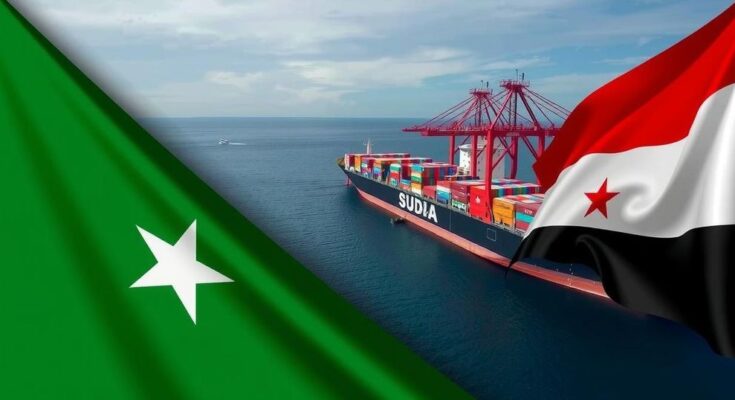Sudan has revoked a port deal with the UAE amid accusations of Abu Dhabi supporting the RSF, a paramilitary group in conflict with Sudan’s military. This decision demonstrates Sudan’s attempt to protect its sovereignty and reaffirm national autonomy in the face of foreign interference. The cancellation has been welcomed by local communities who favor domestic infrastructure development over foreign investments, amid a dire humanitarian crisis.
Sudan has officially cancelled its proposed port agreement with the United Arab Emirates (UAE), a decision interpreted as a protest against the UAE’s purported backing of the Rapid Support Forces (RSF), a paramilitary group engaged in conflict with the Sudanese military. The Sudanese Finance Minister, Jibril Ibrahim, affirmed that the memorandum of understanding to develop the Abu Amama port was not legally binding on Sudan, emphasizing the need to safeguard the nation’s sovereignty. During a press conference in Port Sudan, Minister Ibrahim declared that Sudan would not concede any part of its coastline, reflecting a growing sense of nationalism amidst allegations that the UAE has been providing aid to the RSF since the outbreak of conflict in April 2023. The cancellation may also represent a strategic move to diminish the UAE’s influence within Sudan, part of a broader shift in foreign policy aimed at reinforcing Sudan’s autonomy. Historically, Sudan and the UAE have maintained a complex relationship characterized by cooperation as well as tension. In December 2022, the government had inked an agreement with the Abu Dhabi ports authority and a Sudanese investor for a $6 billion developmental project for the Abu Amama port, aimed at establishing a free trade zone and agricultural initiatives. However, the abrupt cancellation indicates a recalibration of these ties in light of current geopolitical realities. Local sentiments in eastern Sudan, particularly around Port Sudan, have largely leaned towards supporting the cancellation. Residents express a desire for government investment priorities that bolster local infrastructure and create domestic job opportunities, as opposed to expansive foreign-led ventures perceived as potentially detrimental to local economies. As Sudan navigates this complex political landscape, varying perspectives on foreign relations necessitate careful policy formulation, aiming to unify the populace while addressing diverse political interests. Nevertheless, the decision comes amidst escalating humanitarian crises within Sudan, marked by rising inflation, currency devaluation, and deteriorating living conditions for many individuals. The government has urgently sought increased international humanitarian support as the conflict has displaced millions and resulted in severe suffering across communities. Moreover, the cancellation of the port deal holds ramifications extending beyond Sudan’s borders, particularly affecting regional dynamics involving influential neighbors such as Saudi Arabia and Egypt, both of which have vested interests in the Red Sea. The situation underscores the precarious balance of power within the region, compelling Sudan to adeptly maneuver through competing international influences.
The cancellation of the Red Sea port deal underscores the complex political dynamics between Sudan and the UAE, particularly against the backdrop of the ongoing conflict involving the RSF and Sudanese military. This development reflects Sudan’s growing assertion of sovereignty in response to perceived external interference. The original deal, signed in late 2022, aimed at enhancing Sudan’s infrastructure through substantial UAE-backed investment, but has now become a focal point for both local discontent and national policy shifts amidst humanitarian crises. The reaction of local communities and the implications for broader regional relations complicate an already fraught situation.
In summary, Sudan’s cancellation of the port deal with the UAE serves as an emblematic protest against alleged foreign interference and highlights the country’s intent to assert its sovereignty. It raises concerns regarding foreign investment in local economies and reflects the urgent humanitarian challenges Sudan faces. As the government seeks to balance internal and external pressures, the implications of this decision could reshape Sudan’s diplomatic relations in a region characterized by intricate power dynamics.
Original Source: www.theeastafrican.co.ke




